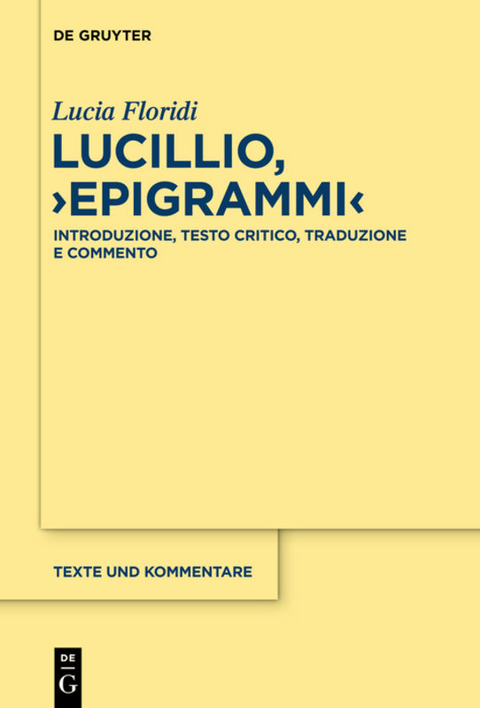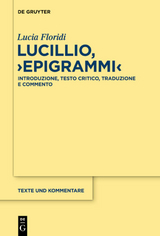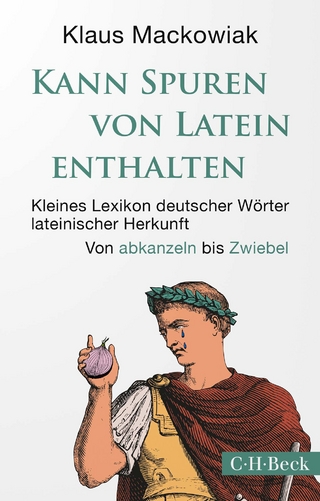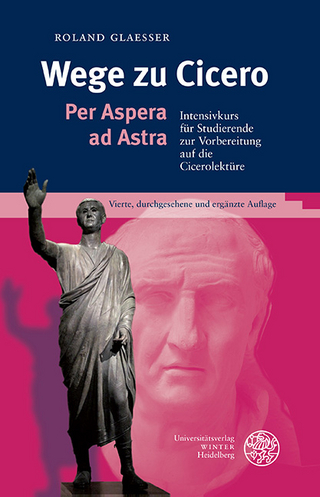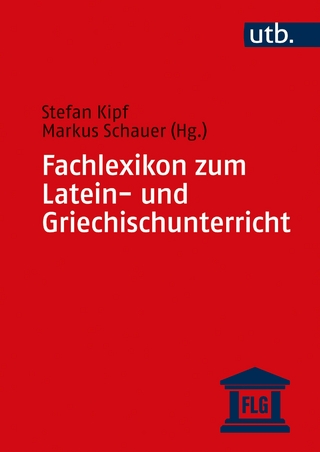Lucillio, "Epigrammi"
Introduzione, testo critico, traduzione e commento
Seiten
2014
De Gruyter (Verlag)
978-3-11-033616-0 (ISBN)
De Gruyter (Verlag)
978-3-11-033616-0 (ISBN)
In der Reihe werden wichtige Neuausgaben und Kommentare zu Texten der griechisch-römischen Antike publiziert, insbesondere kommentierte Ausgaben nur fragmentarisch überlieferter Texte. Ihrem umfassenden Charakter entsprechend leistet die Reihe einen wesentlichen Beitrag zur Erschließung der antiken Literatur.
This is the first modern commentary devoted exclusively to the epigrams of Lucillius, a prolific Neronian poet who, in spite of being one of the most significant representatives of the Greek satirical epigram, has primarily been studied not for his own value, but for the influence he had on Martial. About 140 epigrams of his survive, mostly in book XI of the Anthology. The volume contains an extensive introduction, a new critical text and translation, and a full literary and philological commentary. While the body of the commentary focuses on the particular, providing literary readings of individual epigrams and a line-by-line linguistic, philological, and stylistic analysis, the introduction deals with Lucillius’s identity, the tradition of the text, style, themes, metrics, and cultural setting, and additionally investigates the origins and development of Greek skoptic epigram. Particular attention is paid to the way in which Lucillius engages with the conventions of the genre, often overturning the reader’s expectations. In this way, the work explores the paradox inherent to the fact that a poetic form that was by its nature eulogistic (inscriptional epigrams were born in order to record, and thus celebrate, the dedication of an object or the death of a man) ultimately became the genre of mockery and abuse.
This is the first modern commentary devoted exclusively to the epigrams of Lucillius, a prolific Neronian poet who, in spite of being one of the most significant representatives of the Greek satirical epigram, has primarily been studied not for his own value, but for the influence he had on Martial. About 140 epigrams of his survive, mostly in book XI of the Anthology. The volume contains an extensive introduction, a new critical text and translation, and a full literary and philological commentary. While the body of the commentary focuses on the particular, providing literary readings of individual epigrams and a line-by-line linguistic, philological, and stylistic analysis, the introduction deals with Lucillius’s identity, the tradition of the text, style, themes, metrics, and cultural setting, and additionally investigates the origins and development of Greek skoptic epigram. Particular attention is paid to the way in which Lucillius engages with the conventions of the genre, often overturning the reader’s expectations. In this way, the work explores the paradox inherent to the fact that a poetic form that was by its nature eulogistic (inscriptional epigrams were born in order to record, and thus celebrate, the dedication of an object or the death of a man) ultimately became the genre of mockery and abuse.
Lucia Floridi, Università degli studi di Milano.
"Floridi provides an excellent tool for scholars who wish to learn more about Lucillius and about humour in general in antiquity, as well as about e.g. athletics and social categories. This volume provides a much needed foundation on Lucillius, and leads the way for further research on the author and on the skoptic genre."Cosetta Cadau in: Mnemosyne 1/2016
| Erscheint lt. Verlag | 27.8.2014 |
|---|---|
| Reihe/Serie | Texte und Kommentare ; 47 |
| Verlagsort | Berlin/Boston |
| Sprache | Greek, Ancient (to 1453); italienisch |
| Maße | 155 x 230 mm |
| Gewicht | 1086 g |
| Themenwelt | Geisteswissenschaften ► Sprach- / Literaturwissenschaft ► Latein / Altgriechisch |
| Geisteswissenschaften ► Sprach- / Literaturwissenschaft ► Literaturwissenschaft | |
| Geisteswissenschaften ► Sprach- / Literaturwissenschaft ► Sprachwissenschaft | |
| Schlagworte | Anthologia Graeca • Greek Anthology; Lucillius; skoptic epigram • Greek satire • Greek satire; Lucillius; skoptic epigram • Lucilius, Gaius • Lucillius • skoptic epigram • Skoptisches Epigramm |
| ISBN-10 | 3-11-033616-2 / 3110336162 |
| ISBN-13 | 978-3-11-033616-0 / 9783110336160 |
| Zustand | Neuware |
| Haben Sie eine Frage zum Produkt? |
Mehr entdecken
aus dem Bereich
aus dem Bereich
kleines Lexikon deutscher Wörter lateinischer Herkunft
Buch | Softcover (2023)
C.H.Beck (Verlag)
15,00 €
Per Aspera ad Astra. Intensivkurs für Studierende zur Vorbereitung …
Buch | Softcover (2023)
Universitätsverlag Winter GmbH Heidelberg
23,00 €
